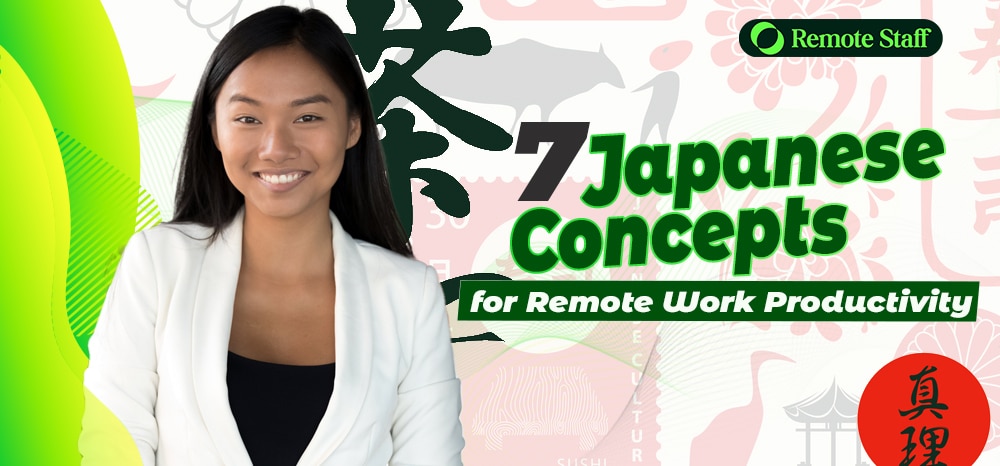The Japanese are world-famous for their exemplary work ethic and quality craftsmanship.
This is thanks to centuries of cultural emphasis on precision, attention to detail, and continuous improvement.
Guess what? You can apply these same Japanese concepts to get better at your online jobs:
Uchiwa
Having difficulty finishing your tasks on time? Look to the Japanese concept of “Uchiwa” for focused and productive bursts.
The term “Uchiwa” literally means a Japanese traditional fan, which can be used to create bursts of air when fanned vigorously.
So, like the Pomodoro technique, Uchiwa productivity bursts involve breaking your work down into manageable intervals of intense focus, typically around 25 minutes, followed by short breaks to recharge.
This structured approach helps combat procrastination and maintain focus, allowing you to accomplish tasks more efficiently and effectively in your online jobs.
Kansei
To become a sought-after remote worker, you must consistently deliver exceptional results to your clients.
This is where the Japanese concept of “Kansei” comes in.
Kansei is the art of doing tasks with focused attention and care while fostering a deeper connection with each one.
This level of attention to detail helps you consistently deliver outstanding results, making you a highly valuable remote worker.
Start by setting clear goals, deadlines, and expectations for tasks, while practicing mindfulness when working on each one.
 Kaizen
Kaizen
Remote workers should constantly improve their skills to advance their careers.
However, how much time and effort should you dedicate to upskilling while balancing existing work responsibilities?
The Japanese concept of “Kaizen” maintains that improvement doesn’t have to happen in one huge continuous block.
Instead, it emphasizes the value of making small, continuous improvements over time, allowing remote workers to gradually enhance their skills without overwhelming themselves.
It’s one of the secrets why Toyota grew to one of the most influential car manufacturers today.
You can start by dedicating short and focused periods each week for learning and skill enhancement, consistently integrating small improvements into your work routine.
Hansei
When it comes to improvement, the Japanese concept of “Hansei” encourages individuals to reflect on past actions and outcomes.
“Hansei” is a Japanese term that translates to “self-reflection” or “introspection.”
It involves deeply examining one’s actions, behaviors, and outcomes, to identify areas for improvement and learn from past experiences.
Additionally, Hansei promotes accountability and personal development, empowering individuals to take ownership of their actions and strive for excellence in their work.
You can practice Hansei by regularly taking time to reflect on how you’re doing, finding ways to improve, making changes based on what you learn, and asking for feedback to get better at your online jobs.
Shokunin
Remote workers who want to succeed should keep striving to get better.
Embracing the “Shokunin” mindset enables remote workers to approach their tasks with dedication, craftsmanship, and a commitment to excellence.
“Shokunin” translates to artisan or craftsman in Japanese, and their craftsmen’s commitment to quality and attention to detail consistently leads to superior results and customer satisfaction.
Furthermore, this mindset instills a strong work ethic and a sense of pride in one’s work, motivating individuals to work diligently and continuously improve their skills.
Wabi-sabi
Mistakes are inevitable, yet some individuals still feel discouraged and give up when they don’t achieve their goals.
The Japanese concept of “wabi-sabi” can help individuals embrace these setbacks in their careers.
“Wabi-sabi” is a Japanese aesthetic concept that appreciates the beauty of imperfection, impermanence, and simplicity.
Wabi-sabi is exemplified in broken objects repaired using gold, highlighting their imperfections as part of their history and beauty.
So by embracing the beauty of imperfection and impermanence, individuals are freed from the pressure of perfectionism and the fear of failure, allowing them to approach tasks with greater confidence and creativity.
Additionally, wabi-sabi promotes mindfulness and appreciation of the present moment, which enhances concentration and productivity.
Ikigai
Have you discovered your life’s purpose? The Japanese concept of “ikigai“ is all about that.
“Ikigai” means “reason for being,” which is an intersection of what you love, what you’re good at, what the world needs, and what you can be paid for.
If your job is aligned with your purpose, you’re more likely to be productive, fulfilled, and motivated at work.
You can start applying this by reflecting on what brings you joy and fulfillment, honing your skills, identifying areas where you can contribute to the world, and exploring how you can turn your passions into a sustainable career.
With the Japanese concepts above, you can further enhance your productivity in your remote working career.
However, if you’re still looking for home-based jobs in the Philippines, you can sign up with Remote Staff for the best remote working opportunities for Filipinos.
Depending on your field, you can find long-term remote clients to showcase your expertise and dedication to quality work, further enhanced by these Japanese concepts.
Register today!




 Kaizen
Kaizen


